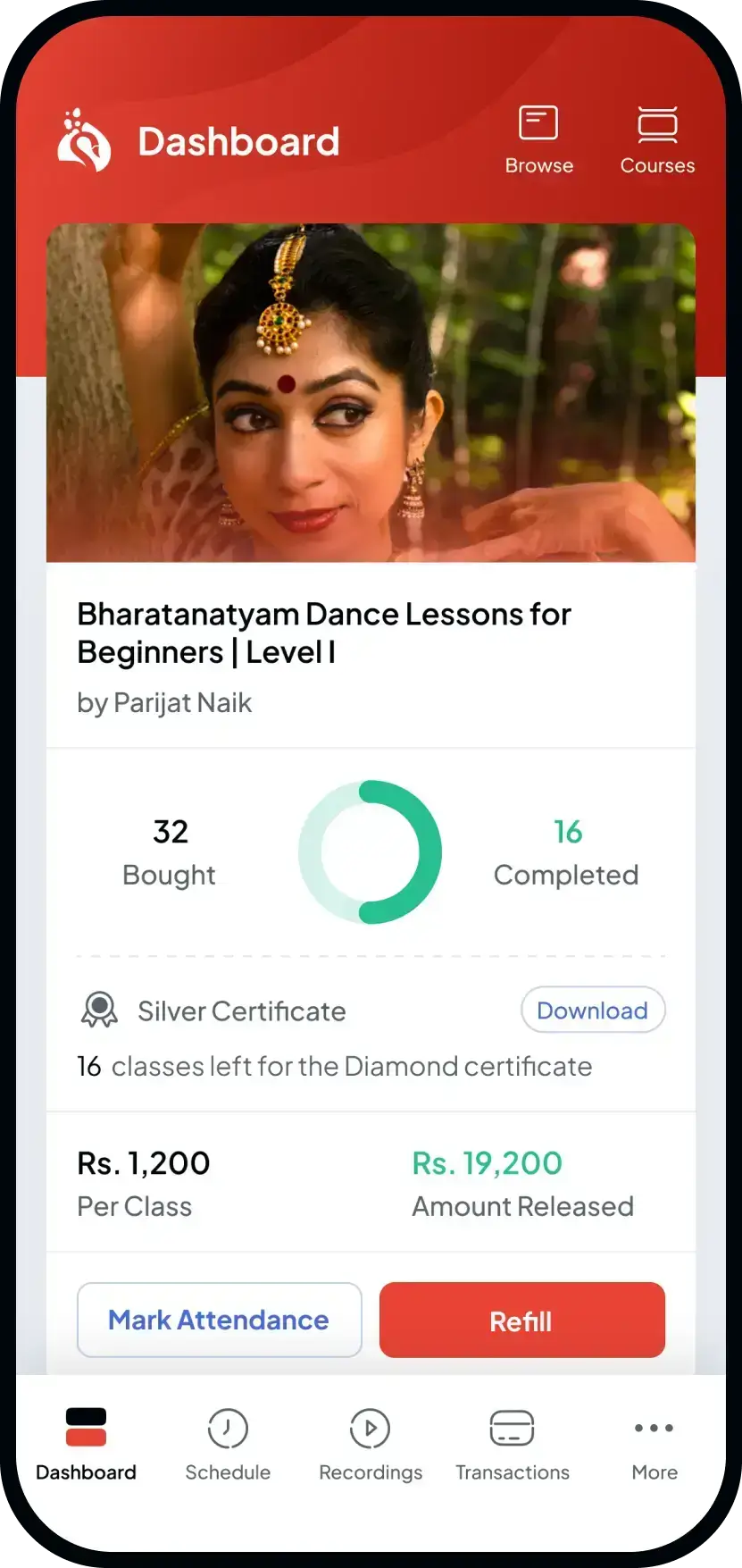Why people love ipassio?
World-class masters as teachers
Personalized & Interactive 1-on-1 classes
Course studio that amplifies learning
Access to the global creative community
Pay as you go - 2 classes at a time
World-class masters as teachers
Personalized & Interactive 1-on-1 classes
Show more
Explore Online Keyboard Courses

Our Happy Learners

Real Progress, Real Impact
Let’s celebrate passion learning
About Online Keyboard Classes
The keyboard is a portal to a universe of sonic possibilities. With its sleek keys and diverse controls, it unlocks the power to create and manipulate sounds in ways that transcend traditional musical boundaries. From the haunting echoes of vintage analog variants to the cutting-edge digital wizardry of modern counterparts, the keyboard is a canvas for musicians and sound enthusiasts alike. It allows artists to explore the diverse layers and textures of music, and dive into experimental realms, giving birth to melodies that resonate with innovation. Whether you're crafting electronic beats, exploring ambient soundscapes, or adding layers to a rock anthem, the keyboard stands as a versatile and indispensable tool in the ever-evolving tapestry of musical expression. That’s exactly why we say - it's not just a keyboard; it's a journey into the boundless realm of sonic exploration.
Keyboards are considered one of the easiest musical instruments to learn due to their user-friendly design. The linear arrangement of keys provides a clear and visual layout, making it easy for newbies to grasp the musical alphabet, scales, and chord structures. Reading sheet music for keyboards is notably straightforward, with notes represented by dots on five horizontal lines, each corresponding to a key on the keyboard. Beginners find immediate gratification as keyboards produce sound instantly upon key press, offering a variety of built-in sounds and settings for exploration. The polyphonic nature of most keyboards allows beginners to create complex sounds and play chords from the outset. Beyond instant enjoyment, learning the keyboard establishes a solid foundation in music theory, fostering skills transferable to other instruments—an invaluable trait for those venturing into diverse musical pursuits.
Get ready to dive into the world of music with the Keyboard on ipassio! Our expert instructors will handhold you through every enchanting note helping you to create myriads of melodies, delving into international sounds, and ensuring to bring out an ace keyboard player in you. Your journey to becoming a Keyboard virtuoso promises to be an enriching endeavor, advancing step by step.
At ipassio, you'll enjoy exclusive access to a personalized curriculum, and our top-notch educators will infuse energy into live, one-on-one sessions, turning learning into a dynamic and enjoyable experience. Let's transform those keystrokes into a musical celebration together, where every note becomes a step toward your musical mastery!
Major cities our students come from :
United States of America : New York, Los Angeles, Fremont, San Jose, Santa Clara, Chicago, Houston, Philadelphia, Phoenix, Dallas, Austin, Denver, Seattle, Detroit, Washington, Boston, Memphis, Nashville, Portland, Las Vegas, Sacramento, Colorado Springs, New Orleans
United Kingdom : London, Birmingham, Leicester, Slough, Leeds, Manchester, Glasgow, Liverpool
India : Bengaluru, Pune, Mumbai, Kolkata, Delhi, Patna, Hyderabad, Chennai, Jaipur
Playing the keyboard requires skills such as hand-eye coordination, finger dexterity, reading sheet music, and knowledge of music theory, rhythm, and timing. Technical proficiency, ear training, creativity, and patience are essential. Musicians also benefit from adaptability, listening skills, and a degree of technological literacy for digital keyboards. Continuous practice is crucial for mastering this multi-faceted instrument.
Not at all. The keyboard is considered to be one of the easiest musical instruments to learn. Its linear arrangement of keys makes it easy for new learners to learn the notes, scales, and chords. And unlike the wind or plucked string instruments, in keyboards, you just have to press the keys to get accurate notes. The keyboard is not only easy to play but it also helps in ear training and voice training for new incumbents in the world of music.
Firstly, offline classes have certain geographical and time restraints which get eradicated when you switch to online classes. The effectiveness of the classes or the curriculum depends on the type of online classes you opt for. If you take up pre-recorded or live group classes, the online classes might not be as effective. It is advisable to opt for live individual classes that offer customized lesson plans.
Playing the keyboard and playing the piano share similarities in terms of pressing keys to produce musical notes, but they are not the same. Pianos are acoustic instruments with weighted keys and a unique mechanism, while keyboards can be acoustic or electronic, often with non-weighted keys and a broader range of sounds. Keyboards are more portable and versatile, and they tend to be more affordable. The touch and feel of the keys differ, requiring some adjustment when transitioning between the two instruments. Both involve fundamental music skills, but the choice depends on personal preferences and musical goals.
While not strictly necessary, learning basic music theory greatly enhances keyboard playing. It aids in reading sheet music, building chords, creating melodies, transposing music, improvising, communicating with other musicians, ear training, and expressing musical ideas more thoughtfully. While one can enjoy playing the keyboard without extensive theory knowledge, a basic understanding opens up new possibilities and enriches the overall musical experience.
Additional Resources
How ipassio works?

Pick your passion
Ranging from music to creative arts, pick what you love!

Interact with an expert
Connect with your teacher over a free 1-on-1 video call to discuss your learning goals.

Set session schedules
Get session schedule matching your timezone

Pay as you go
2 classes at a time, with no long-term commitments.
Start with a free meeting now!
Pick a Course

Student
Teacher
Download our app and get going with your passion.
Get easy access to the pool of world-class educators, enthusiastic learners and everything exciting!
- Explore hundreds of courses from 400+ teachers
- Enroll easily into the course of your choice
- Mark attendance for every class you have completed
- Buy and refill classes with ease
- Schedule classes as per your availability
- Teachers can easily withdraw their fees











